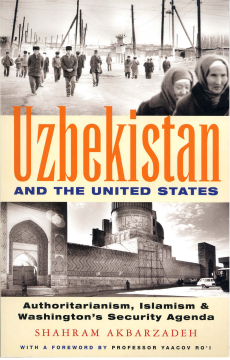
Additional Information
Book Details
Abstract
Uzbekistan, the most strategically situated Central Asian country, has exhibited the most appalling record on human rights and democratic reforms. Yet, post-September 11, a transformation in US policy has suddenly taken place: US troops are now stationed there; Washington has put the Islamic Movement of Uzbekistan on its list of terrorist organizations; and the Bush administration has promised to triple aid to President Karimov‘s highly authoritarian regime.
This unique study explores the central question from a longer-term Uzbek point of view: to what extent are closer ties between Washington and Tashkent contributing to political reforms inside Uzbekistan? Dr Akbarzadeh describes political events since independence, including the emergence of a radical Islamic opposition. He analyses how September 11 has catalysed a transformation in Washington‘s attitude as it perceived a common Islamic enemy, and he examines the possible beginnings of a retreat from Soviet-style politics.
Shahram Akbarzadeh is a senior lecturer in global politics at the School of Political and Social Inquiry, Monash University, Australia. He has researched and published on Central Asia affairs for a decade. Akbarzadeh co-authored the Historical Dictionary of Tajikistan (2002) and co-edited Muslim Communities in Australia (2001) and Islam and Political Legitimacy (2003).
'The more or less great games of Central Asia on occasion produce strange alliances. One of the stranger marriages of convenience is the match between Uzbekistan and the US. Shahram Akbarzadeh reviews its evolution, motives, strengths and pitfalls succinctly in this neat, well-researched and timely monograph. The book usefully contains documents which are difficult to obtain elsewhere.'
Europe-Asia Studies
'Akbarzadeh's articulative book is a timely contribution to the study of Central Asia in that it provides a definitive account of the sociopolitical developments.'
Mehmet Kalyoncu, Center for Eurasian, Russia, and East European Studies, Georgetown University
'Akbarzadeh is careful in his use of ... sources, and few scholars or policy makers will quarrel with his overall conclusions about the nature of Karimov's regime and the overall shape of US and Uzbek foreign policy ... [a] concise and well written account.'
The International History Review
Table of Contents
| Section Title | Page | Action | Price |
|---|---|---|---|
| cover | Cover | ||
| Contents | v | ||
| Acknowledgements | vii | ||
| Chronology | viii | ||
| Map of Uzbekistan | xi | ||
| Foreword | xii | ||
| Introduction | 1 | ||
| Notes | 6 | ||
| 1 From Soviet to Post-Soviet Authoritarianism | 7 | ||
| Leadership | 8 | ||
| Islam | 17 | ||
| Notes\r | 20 | ||
| 2 Islamic Challenge | 24 | ||
| Emerging Islamism | 25 | ||
| Resurgence of Islamic Radicalism | 29 | ||
| Notes\r | 37 | ||
| 3 Tashkent’s Foreign Policy Decisions | 39 | ||
| Responding to the Tajik Civil War | 40 | ||
| Afghanistan | 42 | ||
| Seeking International Support | 45 | ||
| Conclusion | 51 | ||
| Notes\r | 52 | ||
| 4 Uzbekistan and the United States: A Difficult Relationship | 56 | ||
| Uzbek Overtures | 57 | ||
| The US Response | 61 | ||
| Winds of Change | 65 | ||
| Conclusion | 68 | ||
| Notes\r | 69 | ||
| 5 September 11 and the ‘War on Terror’ | 72 | ||
| US–Uzbek Partnership | 74 | ||
| Handling Russian Concerns | 78 | ||
| Conclusion | 82 | ||
| Notes\r | 84 | ||
| 6 Human Rights and Democracy | 87 | ||
| Political Parties | 89 | ||
| Human Rights and NGOs | 93 | ||
| Political Prisoners and Torture | 96 | ||
| Freedom of Expression | 99 | ||
| Conclusion | 102 | ||
| Notes\r | 103 | ||
| 7 Prospects for Authoritarian Withdrawal | 107 | ||
| Notes | 117 | ||
| Postscript | 119 | ||
| Appendix A: The Constitution of the Republic of Uzbekistan | 121 | ||
| Appendix B: Extracts from the Report of the Special Rapporteur on the Question of Torture, Theo van Boven | 149 | ||
| Appendix C: The Call to Jihad by the Islamic Movement of Uzbekistan | 157 | ||
| Select Bibliography | 160 | ||
| Index | 163 |
